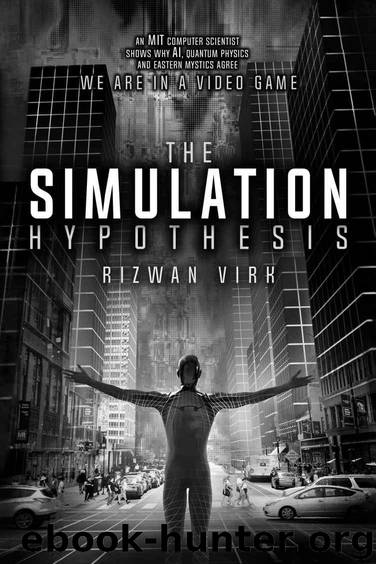The Simulation Hypothesis by Rizwan Virk

Author:Rizwan Virk
Language: eng
Format: azw3, epub
Tags: estern religions, video games, artificial intelligence, quantum physcis
ISBN: 9780983056904
Publisher: Bayview Books
Published: 2019-03-31T04:00:00+00:00
Parallel Universes and the Simulation Hypothesis
The theory that all reality is in fact an artificial or virtual simulation might be the only practical way that the many world interpretation (MWI), the delayed-choice experiment and the idea of future probable scenarios could be true or implemented. If the universe is seen as a virtual world with a game state, then we can envision how multiple probable futures can be generated (as information, not as physical worlds), and then choices can be made through this branching tree of possibilities using some evaluation function.
In particular, the simulation hypothesis provides a better model for how these aspects of our reality could actually work:
Branching. Spinning off multiple probable realities, while extremely difficult for a physical reality, is almost a trivial matter if we are in a simulated reality. The nature of simulations is such that you can branch off multiple simulations using the same computing power and without requiring additional physical resources. This is true whether you subscribe to the “real” or the “unreal” interpretation of many worlds. Obviously if it’s the “real” interpretation, then the physical universes need to be copied. If it’s unreal, then these are probabilities and are really a type of computation that can be done like AI in video games.
Optimization. As we look at the maximum number of universes as something less than infinity, we can start to think about how to optimize creation and storage of all the information in the “universe.” While originally thought of as a physics problem, this is actually a computation problem and one that has been solved to get our video games into the state that we have them today. We optimize based on sameness of pixels in graphics, tilling, reducing duplication of information, and caching what’s needed. Similarly, the only way to have so many different universes may be to optimize based on the sameness of universes—which are near each other and which branch out.
Retrocausation. The idea that the future can influence the past is non-intuitive and provides for the ability of paradoxes. However, if the futures are possible futures rather than actual futures that are sending back information to the present based on an evaluation function, then this becomes a more understandable process.
Download
This site does not store any files on its server. We only index and link to content provided by other sites. Please contact the content providers to delete copyright contents if any and email us, we'll remove relevant links or contents immediately.
| Computer Vision & Pattern Recognition | Expert Systems |
| Intelligence & Semantics | Machine Theory |
| Natural Language Processing | Neural Networks |
Algorithms of the Intelligent Web by Haralambos Marmanis;Dmitry Babenko(18334)
Jquery UI in Action : Master the concepts Of Jquery UI: A Step By Step Approach by ANMOL GOYAL(10487)
Test-Driven Development with Java by Alan Mellor(7768)
Data Augmentation with Python by Duc Haba(7637)
Principles of Data Fabric by Sonia Mezzetta(7407)
Learn Blender Simulations the Right Way by Stephen Pearson(7319)
Microservices with Spring Boot 3 and Spring Cloud by Magnus Larsson(7161)
Hadoop in Practice by Alex Holmes(6753)
RPA Solution Architect's Handbook by Sachin Sahgal(6539)
The Infinite Retina by Robert Scoble Irena Cronin(6249)
Big Data Analysis with Python by Ivan Marin(5971)
Life 3.0: Being Human in the Age of Artificial Intelligence by Tegmark Max(5558)
Pretrain Vision and Large Language Models in Python by Emily Webber(4927)
Infrastructure as Code for Beginners by Russ McKendrick(4681)
Functional Programming in JavaScript by Mantyla Dan(4561)
WordPress Plugin Development Cookbook by Yannick Lefebvre(4423)
The Age of Surveillance Capitalism by Shoshana Zuboff(4292)
Embracing Microservices Design by Ovais Mehboob Ahmed Khan Nabil Siddiqui and Timothy Oleson(4179)
Applied Machine Learning for Healthcare and Life Sciences Using AWS by Ujjwal Ratan(4162)
